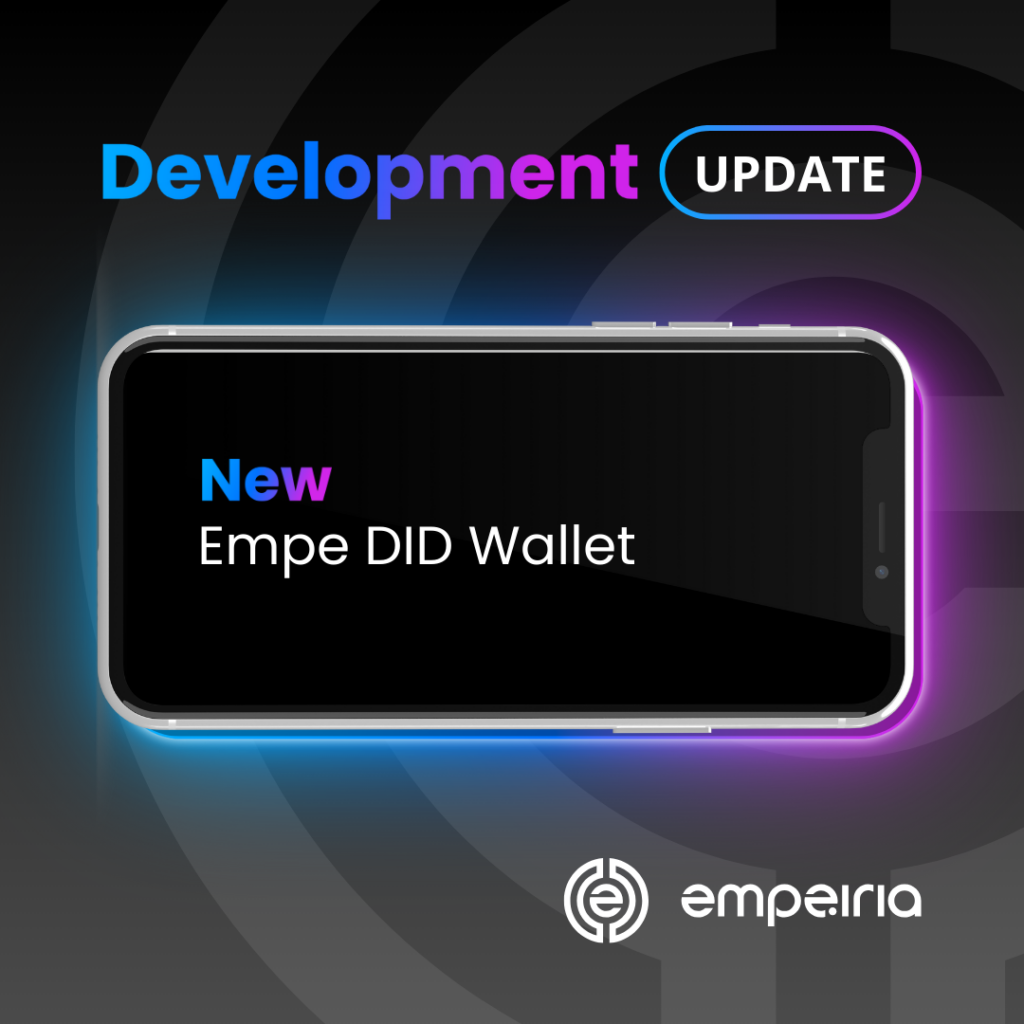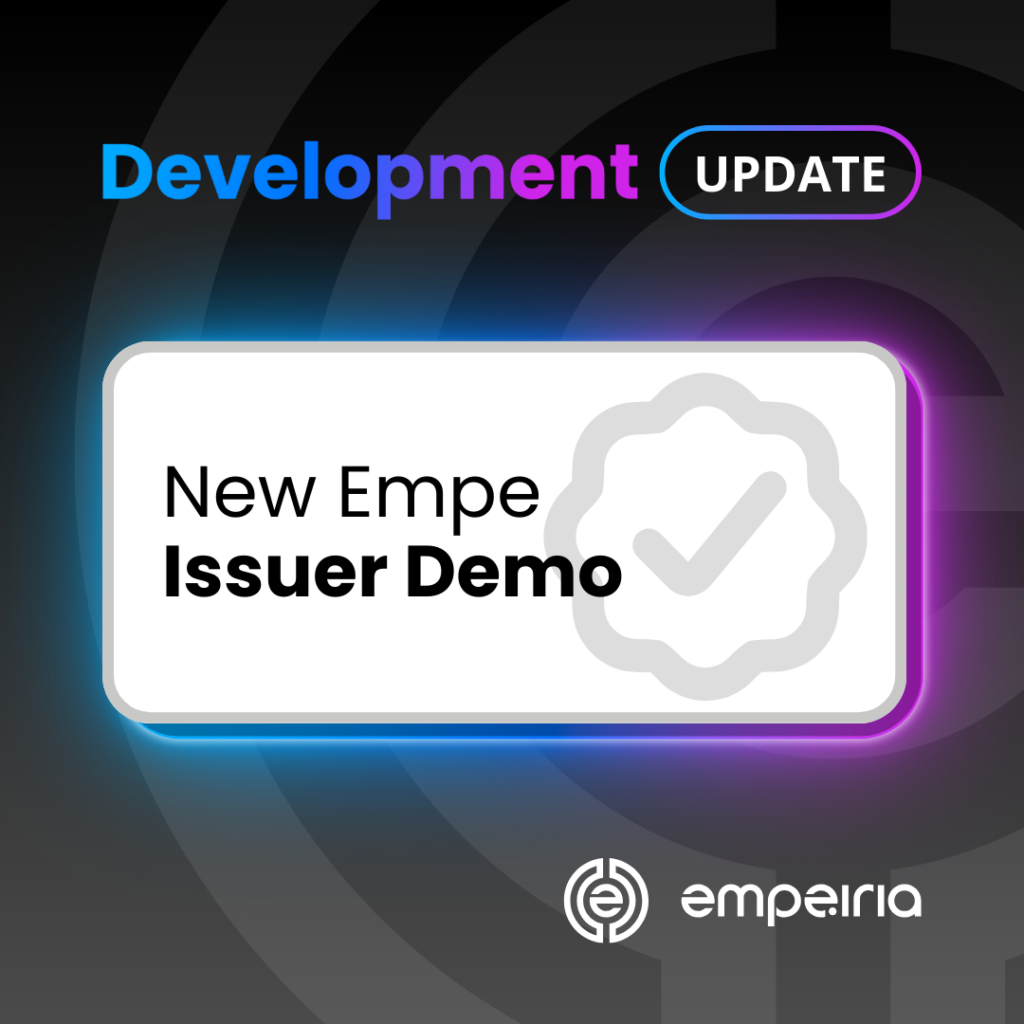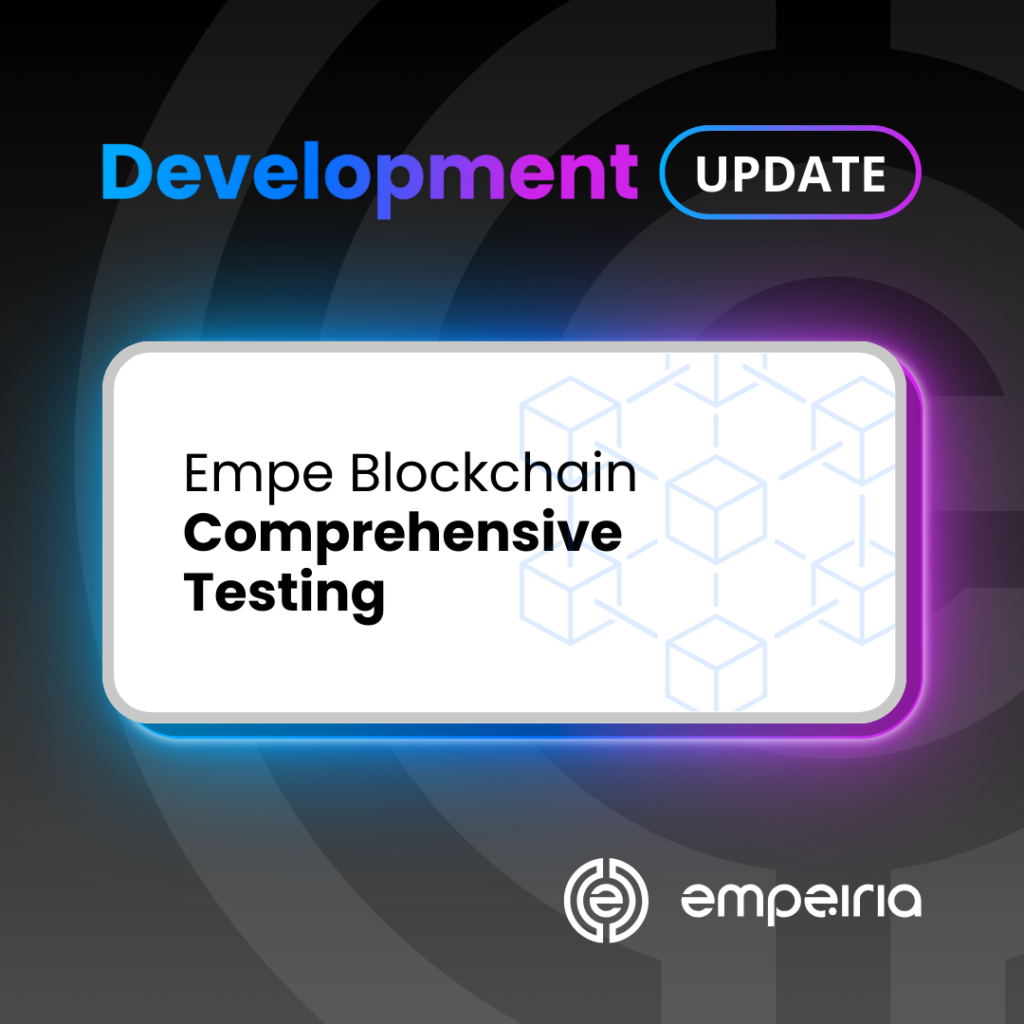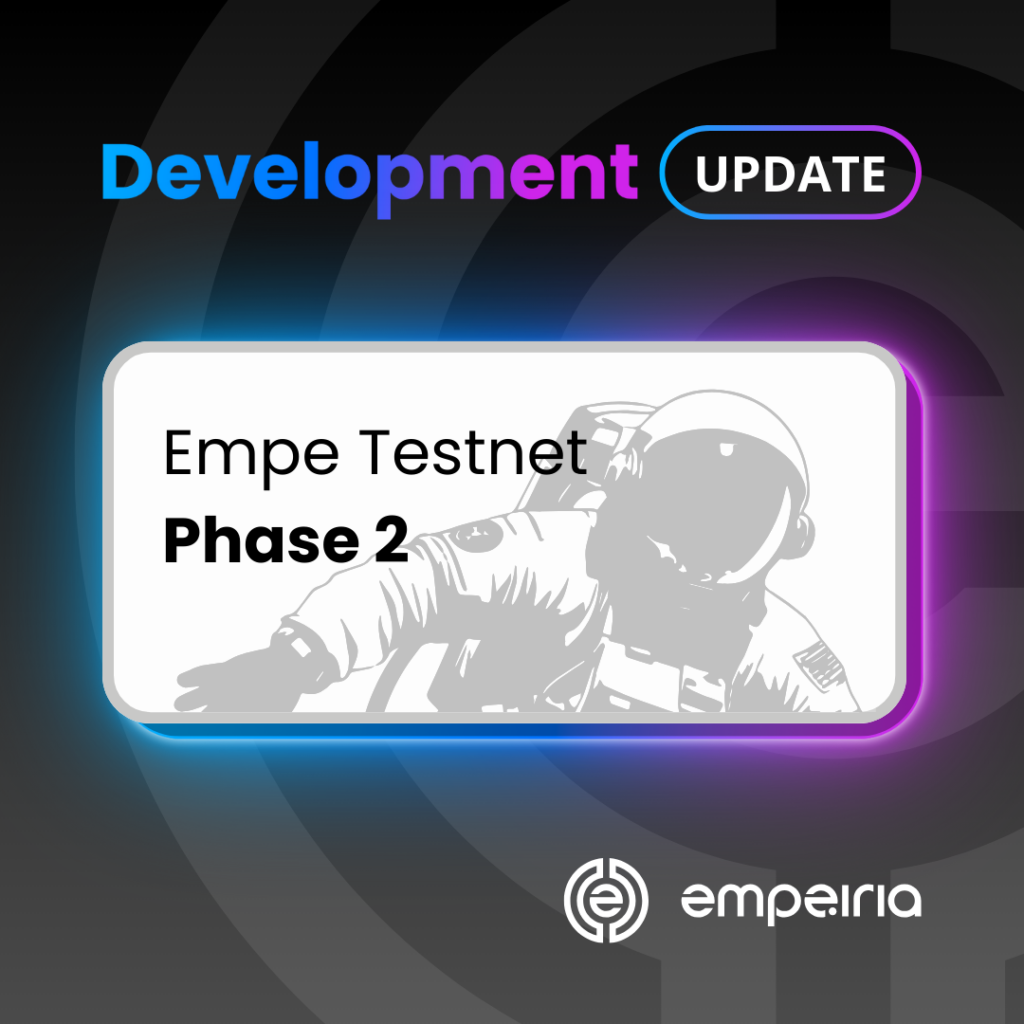Welcome to the latest Empeiria Development Update. June has been a pivotal month for Empeiria, marked by a wave of new tech releases, updates, and enhancements to our End-to-End Verifiable Data Infrastructure (EVDI). We’ve completed a series of upgrades and new features that bolster the security, usability, and interoperability of our Verifiable Data platform. These developments are a direct result of our extensive R&D, commitment to continuous improvement, and user feedback. Below are the key updates for the past month:

New Empe DID Wallet
We begin this Empeiria Development Update with major news: just released on both the Apple App Store and Google Play Store, the New Empe DID Wallet, used in tandem with the Empe Issuer Demo, serves as a gateway into Empeiria’s End-to-End Verifiable Data Infrastructure (EVDI).
Built entirely on the Empe DID Wallet SDK, the new wallet enables developers to seamlessly build PoCs for their use cases in minutes before embedding the SDK into their applications.
This latest iteration of Empe Wallet is 3x faster and 90% lighter than the previous version. Built on Self-Sovereign Identity (SSI) principles, it is a secure, privacy-focused solution for managing and sharing Verifiable Credentials, empowering users with complete control over their data.
The wallet is non-custodial, meaning neither third parties nor Empeiria can access user data without explicit consent. State-of-the-art encryption protocols guard private data against unauthorized access.
The wallet adheres to W3C, OpenID, and IETF standards: DID, SD-JWT, OID4VC, OID4V, and SIOPv2 to ensure seamless data interoperability across platforms.
Alongside the Empe Issuer Demo, the new Empe DID Wallet showcases a quick and convenient way to issue, claim, and store various types of Verifiable Credentials.
You can download the latest version of Empe DID Wallet on the Apple App Store and Google Play Store now.
HD Wallet for Key Creation
The Empe DID Wallet now supports Hierarchical Deterministic (HD) wallets for key creation. HD wallets generate a tree of keys from a single seed phrase, allowing for the creation of multiple private and public keys securely and hierarchically.
This makes it easier to manage multiple accounts and keys, improves security, and ensures that users can recover their wallets using a single seed phrase.
Secure Vault for Safe Data Storage
The new version of the wallet has been enhanced with a secure vault feature for safe data storage. It is designed to protect sensitive information, such as private keys, personal identification details, and other critical data, by encrypting it and storing it in a secure environment.
This ensures that data is protected against unauthorized access and data breaches, giving users the confidence that their sensitive information is secure.
Technical Specifications:
- Wallet DID: did
(curve secp256k1) - SDK Development Environment: Node.js
- Standards: W3C, OpenID, and IETF standards: DID, SD-JWT, OID4VC, OID4V, and SIOPv2
Features:
- Easily Generate Decentralized Identifiers (DIDs): Create a unique and secure identity for your digital interactions.
- Collect & Manage Verifiable Credentials: Efficiently gather, store, and manage your Verifiable Credentials in one place, ensuring seamless interactions and data sharing across platforms.
- Interoperability: Built on W3C, OpenID, and IETF standards including DID, SD-JWT, OID4VC, OID4V, and SIOPv2 to ensure seamless data interoperability across platforms.
- Enhanced Security: Advanced encryption protocols protect your data from unauthorized access, ensuring privacy and security.
- Noncustodial Design: Complete control over your data, with no third-party or Empeiria access without your explicit consent.
- User-Friendly Interface: Intuitive and easy-to-use interface for both novice and experienced users.
- Cross-Platform Compatibility: Compatible with multiple platforms, enabling a broad range of use cases and integration scenarios.
- Seamless Developer Experience: Developers can build Proofs of Concept (PoCs) for their use cases in minutes before embedding the Empe DID Wallet SDK into their applications.

New Empe Issuer Demo
Available at issuer-demo.empe.io, the new Empe Issuer demo is a web platform that enables users to experience verifiable data with in-wallet Verifiable Credentials Offering (VCO), Proof of Attendance (POAP), and Proof of Purchase (PoPP) based on Verifiable Credentials. Credentials issued with the Empe Issuer Demo can be claimed and stored in seconds using the new Empe DID Wallet.
Support for OIDC 4 VC Authorization Code Protocol
The issuer server supports the OpenID Connect for Verifiable Credentials (OIDC 4 VC) authorization code protocol. This protocol enhances the security and interoperability of Verifiable Credentials by leveraging the well-established OIDC framework. It allows for more secure and standardized issuance and verification of credentials, ensuring that the identity data can be trusted and handled securely across different systems.

Empe Blockchain Comprehensive Testing
This Empeiria Development Update has something for blockchain enthusiasts too. Since the launch of the Empe Testnet, our priority has been to ensure smooth and secure operations of our blockchain infrastructure. To achieve this goal, we’ve developed a range of automated testing frameworks:
E2E Testing Framework
End-to-end (E2E) tests are crucial for ensuring the robustness and reliability of a blockchain network. They enable comprehensive testing of the entire system, validating interactions between various components under realistic conditions. By simulating real-world scenarios, E2E tests can identify potential issues that may not be evident in isolated unit tests or integration tests. These tests are especially beneficial for detecting bugs in complex operations like chain upgrades, consensus mechanisms, and cross-node communication. Furthermore, E2E testing helps in verifying that all nodes in the network can correctly process transactions, handle network partitions, and recover from failures, thus ensuring the integrity and security of the blockchain. By automating these tests using Docker containers, we can achieve consistent and repeatable test environments, making it easier to diagnose and fix issues promptly.
Simulation Testing
For even more rigorous testing, we’ve introduced simulation testing to simulate real-world scenarios and assess system performance under various conditions. These tests involve issuing numerous randomized operations with controlled predictability to evaluate the interactions within the system. By simulating a wide range of scenarios, we can identify potential issues that might not be apparent during standard unit or integration testing. Simulation testing helps us examine how different operations interact with each other, ensuring that the blockchain does not end up in unexpected conditions or states.
This comprehensive approach enhances the readiness of EVDI for real-world deployment, ensuring scalability, resilience, and robustness. Automating these simulation tests creates consistent and repeatable test environments, making it significantly easier to diagnose and fix bugs promptly, thus enhancing the overall security and functionality of the blockchain.
Monitoring Mechanisms
To track the state of Empe Blockchain, we have implemented robust monitoring mechanisms using the Prometheus system to monitor our validator nodes. This system allows us to continuously monitor the operational status and performance of the validators, enabling us to detect any issues or failures promptly.
Additionally, to enhance network security, we have introduced a jumper host setup. This setup acts as an intermediary layer, adding an extra level of protection against potential threats. By securing access to the network through a controlled and monitored host, we ensure that our infrastructure meets the highest protection standards against potential security breaches.
These combined efforts in monitoring and security help us maintain a resilient and secure blockchain environment, ensuring reliable operation and swift issue resolution.

Empe Testnet: Phase 2
With these milestones achieved, we are advancing into Phase 2 by extending access to Empe Testnet to external validators. External validators play a critical role in the testnet by securing the network and validating transactions, thereby ensuring the integrity and reliability of data.
To streamline the integration process, we have devoted significant attention to providing clear and detailed instructions for external validators in the newly developed technical documentation. By outlining hardware requirements, detailed steps, and best practices, we ensure a smooth onboarding experience, fostering a collaborative environment where validators can easily contribute to and benefit from our evolving ecosystem.
That’s it for this month’s Empeiria Development Update. Thank you for your continued support and feedback, which drive our innovation and improvement. For any additional questions or suggestions, please contact our technical team at [email protected]. Follow Empeiria on Twitter/X, or LinkedIn for the latest news & updates.














